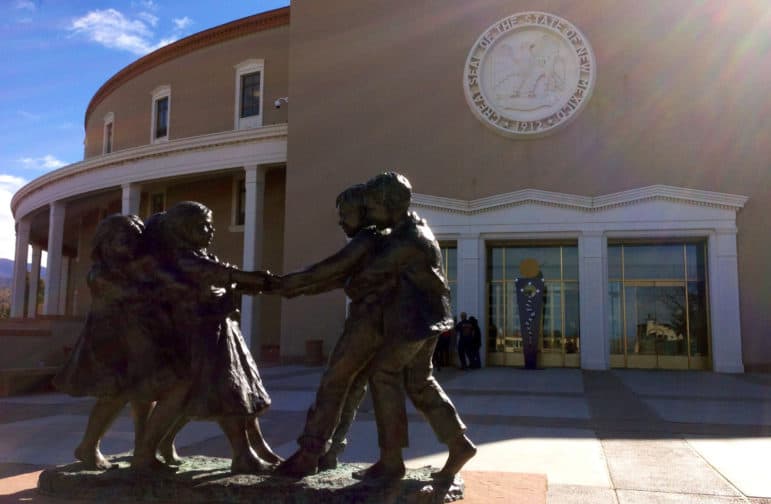
Heath Haussamen / NMPolitics.net
A statue outside the Roundhouse in Santa Fe.
With the state wracked by successive corruption scandals involving top officials, several lawmakers seem to agree that this is the year for ethics reform in New Mexico.
A committee of the state House of Representatives gave a boost to those hopes Thursday by advancing a bipartisan proposal to establish an independent ethics commission through a constitutional amendment. The commission would have the power to investigate complaints of misconduct by public officials, candidates, lobbyists and contractors. The complaints would be public, and the commission’s opinions could be appealed to the state courts.
Campaign finance reform advocates and good government groups have fought for years to create such a body. But similar measures passed by the House in the recent past have floundered in the Senate, making Thursday’s 8-1 vote by the House State Government, Indian and Veterans Affairs Committee just the first step in what will likely be a much longer process.
“We’ve been talking about this idea a long time,” Democratic state Sen. Jeff Steinborn of Las Cruces, one of the sponsors of the measure, told the House committee. New Mexico is currently one of only eight states without such a commission, he said. “I think this is the time that we do this.”
The League of Women Voters and Common Cause New Mexico have made the proposal a priority this session, which closely follows an expensive and sometimes vicious election and the resignation of the state’s top tax official amid a criminal investigation. Taxation and Revenue Secretary Demesia Padilla stepped down the day after state investigators raided her agency’s offices and seized tax documents belonging to her and her husband.
The proposal, House Joint Resolution 8, also comes as a new secretary of state, Maggie Toulouse Oliver, takes office after campaigning heavily on ethics reform and establishing just such a commission. Toulouse Oliver is serving the last two years remaining from the term of former Secretary of State Dianna Duran, who resigned in 2015 after pleading guilty to fraud charges.
In another fraud case involving a top state official, former state Sen. Phil Griego, a San Jose Democrat, faces a trial in October on charges stemming from a real estate deal he brokered involving state property. Griego stepped down just before the end of the 2015 legislative session when questions about the sale emerged.
Along with Steinborn, HJR 8 was sponsored by Reps. Jim Dines, R-Albuquerque, and Las Cruces Democrats Bill McCamley and Nathan Small. It would ask voters in the next general election to establish the seven-member commission by enshrining it in the state constitution.
The governor would appoint three members, none from the same political party and each representing a different congressional district. The other four members would be appointed by leading legislators from both parties.
Heather Ferguson, legislative director for good government group Common Cause New Mexico, said the ethics panel is essential. “We think this is a critical step in rebuilding voters’ trust in our system,” she said.
The resolution heads to the House Judiciary Committee, along with a different bill to establish what it calls a “public accountability board.”
Proposed by Sen. Daniel-Ivey Soto, D-Albuquerque, and Rep. Daymon Ely, D-Corrales, the 12-member, bipartisan board would not only have authority over campaign finance reporting and conflicts of interest but also the state’s open records and meetings law.
But the board would not have much authority over legislators. Instead, it proposes expanding the powers of the Legislative Ethics Committee — a panel of lawmakers that convenes if a complaint is filed — and adding to the committee’s ranks two nonvoting members of the public appointed by the leaders of each chamber.
Open government groups raised concerns, however, about provisions in the bill that would allow the board to act in secret. Complaints filed with the board would be kept confidential unless the board determined there was wrongdoing or if the subject of the complaint decided to disclose the records.
Ely argued that the provisions protect public officials from frivolous complaints.
But Laura Paskus, president of the Rio Grande Chapter of the Society of Professional Journalists, countered that such measures mean “this bill does not increase transparency in the state of New Mexico.”
“And in some key areas, it actually reduces transparency,” she said.
Peter St. Cyr, the executive director of the New Mexico Foundation for Open Government, urged members of the committee to amend it and continue working on it over the next year.
A modified version of the measure advanced 6-3, with Republicans voting against it except for Rep. Bill Rehm, R-Albuquerque, who offered his reluctant support.
“This isn’t ready for prime time,” he said. “But I do think this is something that’s needed.”
Meanwhile, the only member of the committee to vote against advancing both bills questioned whether the state needs a new system for investigating corruption and cracking down on violations of the campaign finance laws, or whether it would be better served by fully funding the cash-strapped offices already tasked with those duties.
“Why aren’t we just helping them to do their job in statute now rather than creating a lot of government?” said Rep. Yvette Herrell, R-Alamogordo.
Contact Andrew Oxford at (505) 986-3093 or aoxford@sfnewmexican.com. Follow him on Twitter at @andrewboxford.